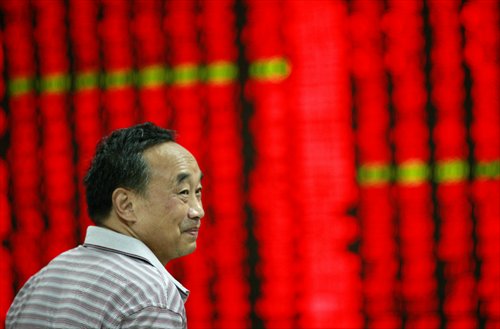New probe launched in ongoing market crackdown
Efforts to curb margin trading boosting stability: analysts

An investor checks stock information at a brokerage in Huaibei, East China's Anhui Province on Wednesday. Photo: CFP
The authorities on Wednesday announced the latest step in their fight against illegal activities in Chinese mainland stock markets, with the two main exchanges showing signs of stabilization after the recent slump.
Zhang Yujun, assistant chairman of the China Securities Regulatory Commission (CSRC), has been placed under investigation for suspected serious violations of discipline and laws, according to a statement on the website of the CPC Central Commission for Discipline Inspection on Wednesday.
The investigation comes at a time when there are signs of improvement in the mainland stock markets, following a dramatic slump of more than 40 percent since mid-June.
The Shanghai Composite Index rose 4.89 percent or 147.09 points to close at 3,152.26 points on Wednesday, while the Shenzhen Component Index rose by 6.45 percent or 599.62 points to 9,890.43 percent.
The CSI 300 Index of the biggest companies traded in Shanghai and Shenzhen rose 4.98 percent or 157.02 points to end at 3,309.25 points.
ChiNext, the country's NASDAQ-style board for high-tech and emerging start-ups, climbed 7.16 percent or 128.69 points to close at 1,926.24 points on Wednesday.
More than 1,000 stocks surged by the daily trading limit of 10 percent on Wednesday, with the transportation equipment and nonferrous metal sectors showing strong performance.
A Shanghai-based analyst told the Global Times on condition of anonymity that the rise on Wednesday was related to the government's recent efforts to crack down on margin trading.
Shao Yu, an analyst at Orient Securities, told the Global Times that mainland stock markets have moved into a relatively "stable period," following the government's efforts to control margin trading and reduce the stock market bubble.
The government has taken measures to crack down on illegal over-the-counter margin trading accounts, which lend money to investors for leveraged stock investment.
The government has checked and closed 3,255 accounts suspected of being used for over-the-counter margin trading as of September 11, according to an announcement by the CSRC on Monday.
But there still needs to be a "buffer period" for the complete clearance of such practices, the 21st Century Business Herald reported on Wednesday, citing several sources.
According to a report by domestic news website ycwb.com on Wednesday, the volume of margin trading on the two markets in Shanghai and Shenzhen had slumped to about 956 billion yuan ($150 billion) as of Monday, the lowest level in 2015.
However, there is still uncertainty about whether mainland stock markets might tumble further.
Shao said it's still too early to say that the stock markets are recovering, as there are still some factors that could drag it down in the future.
"For example, mainland stocks might slump if the US Federal Reserve announces an interest rate rise in the near future," Shao said.
But he noted that if the US decides against the interest rate rise, it might benefit the mainland markets.
Yu Fenghui, a financial commentator, told the Global Times on Wednesday that the current stabilization in the domestic stock markets still lacks a solid foundation, as recent economic data has shown that the real economy is still facing downward pressure.
Uncertainty also still prevails in the Hong Kong stock market, causing many investors to halt their investment in new IPOs, the Wall Street Journal reported on Monday.
The Hang Seng Index climbed 2.34 percent or 502.36 points to close at 21,958 points on Wednesday, following continued declines for more than five weeks.
The Hong Kong stock market has fallen more than 20 percent since hitting a 52-week high in April.
Shao noted that the mainland economy exerts considerable influence on the Hong Kong stock market, as many of the companies listed in Hong Kong are mainland firms.